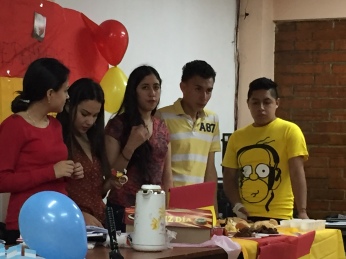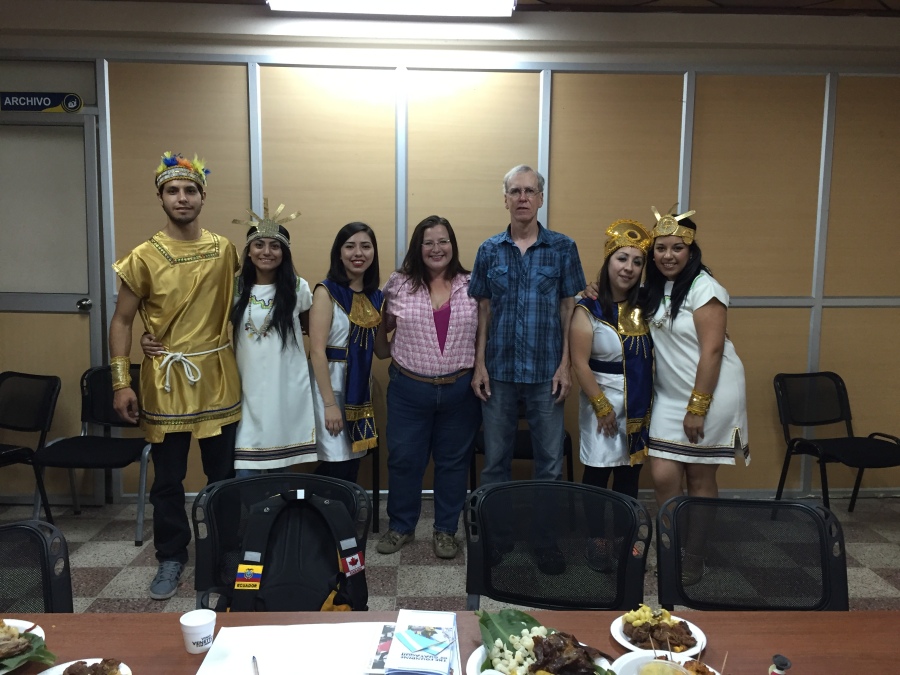The mission to improve one’s fluency is never-ending when one is speaking a non-native language. One of the kids in my childcare-volunteer spot told me this week, “¡Tu eres tonta!” (“You are stupid”…and the familiar form of you, very disrespectful). To be fair, I had just taken away the whistle he had been blowing, full-blast, continuously for five minutes. But I can remember being a child myself, and thinking that people who didn’t speak English well were stupid because they didn’t understand the simplest things!
There is no substitute for talking with a native speaker. This is why I jumped at the chance to participate in the Universidad Católica de Cuenca’s language exchange program. Native English-speaking participants sit down with classes of young people who are studying English and simply converse. We keep track of our hours, and when the university goes on Spring break, we get an equivalent number of hours of small-group Spanish classes! I’ve spent a total of 8 hours with these charming young people over the past three weeks, and it has been eye-opening. The public schools here start teaching English in elementary school, so many of these students have been taking English every year for 12, 13, or 14 years. Their actual speaking ability varies widely, but there are quite a few who are more than a little lost: I will say, “What do you do when you go to the beach?” And they will respond, “Yes,” for example. The girls, especially, are shy and timid and speak in a very quiet voice. I tell them about a music teacher I once heard tell a student: “You’ve got to hit those bad notes HARD!” I urge them to make mistakes, more and more and more mistakes, because that’s how you learn! (And I’ve made some doozies in Spanish, believe me!)
The class groups I have worked with have been students in pre-med, dentistry, nursing, law, and psychology. They are bright and dedicated kids. Just like in the US, it’s a struggle for some more than others. One girl is working as a nurse’s aide while studying to be a nurse and supporting her 1-year-old daughter. Some of the students just go to school, live at home with their parents, and go out and have fun on the weekends.
But yesterday, my English-speaking teaching partner, Cecil, and I showed up for our usual group discussion session, but we got a surprise! We walked into the room, and there were the charming young folks all dressed up in costumes with posters and food and decorations! We were directed to step over an arrangement of fresh rose petals to assume a place of honor, where we were treated to presentations about three events: Inti Raymi, a tradit ional indigenous celebration; the Independence of Guayaquil; and the Independence of Cuenca. The young people had obviously worked really hard on the costumes and the presentations, and we enjoyed them immensely.
ional indigenous celebration; the Independence of Guayaquil; and the Independence of Cuenca. The young people had obviously worked really hard on the costumes and the presentations, and we enjoyed them immensely.

When we saw what happened next, we were both glad we’d happened to skip lunch that day! Each group of students had prepared a meal of typical Ecuadorian food for us, and the charming youngsters just kept coming up to us and presenting us with little dishes of different delicacies: moté, hornado, bolones, paticones, even a quarter cuy!  All I could manage was to take a bite of each dish; there was so much food! And, despite being a school function, during a class, they kept the relaxed, always-ready-to-party attitude by serving us canelazo, the traditional alcoholic cinnamon tea they serve in the mountains to keep warm (alas, I could only taste it, due to my gout…but Cecil was happy to take mine!).
All I could manage was to take a bite of each dish; there was so much food! And, despite being a school function, during a class, they kept the relaxed, always-ready-to-party attitude by serving us canelazo, the traditional alcoholic cinnamon tea they serve in the mountains to keep warm (alas, I could only taste it, due to my gout…but Cecil was happy to take mine!).

We had so much food left when we were done, I wrapped a big plate up in foil to bring to Steve. I waved goodbye to the capable teacher and her lovely and charming students, “¡Gracias a todos!” And off I went. As I walked through the busy streets, I reflected on how stimulating it is to be meeting these bright young people, the future of their country. As I help them learn to speak the global language I was lucky enough to have as my mother tongue, they are helping me learn something else: how to enjoy life. What a great trade!


Wow such interesting and wonderful stories Peri. You are definitely having too much fun there – I’m jealous :). It sounds like a very rewarding thing to be doing and the video was great to see. I can’t remember if you took Spanish at JHS 104? I took French but wished I had learned Spanish instead. (Not that I learned French either.). I’ really enjoy reading your blog. Just recently left a comment but I’ve been reading all your chapters and look forward to hearing about your next adventure.
LikeLiked by 1 person
I read all your chapters and am looking forward to hearing about your next adventure. It sounds like you’ve found some extremely rewarding things to do there. And so wonderful that you have a good man to share all this with :). I’m not jealous or anything (lie) — just happy for an old friend (true).
Did you take Spanish at JHS 104? I can’t remember. I took French but didn’t learn it.
LikeLiked by 1 person
I did take Spanish in JHS and a couple of years in HS, but I learned a lot on the streets, buses, and subways too…the Upper West Side was full of Puerto Ricans and Dominicans back then! I hope you know you are welcome to stay in our spare bedroom any time you want to check out beautiful Cuenca, Ecuador!
LikeLike
Thanks Peri! I’ll definitely keep your kind offer in the back of my head. Would love to visit sometime.
LikeLike
How beautiful to see how highly they regard you!
LikeLiked by 1 person
what a wonderful experience. You are giving and receiving so much.
LikeLiked by 1 person
I’m wondering how fluent in Spanish one need to be in order to do this volunteer work…mine is VERY limited.
Mike Lentint,
LikeLike
Zero español is required for this exchange. In fact, knowing Spanish is kind of an impediment because the whole goal is for the students to practice their English in a safe environment with native speakers. Then, when the school is on break, you get to take individual Spanish lessons with the teachers, so your Spanish will improve!
LikeLike